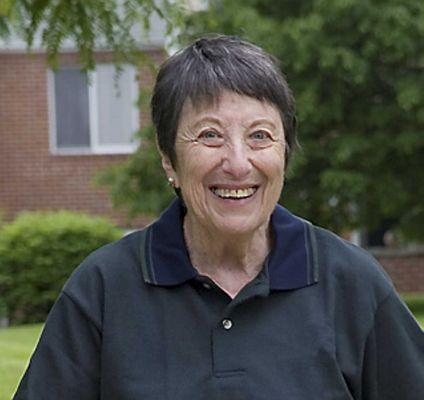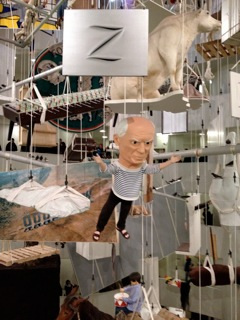|
Doctor, I think I’ve had a breakthrough.
I’ve actually taken two summer vacations of nearly a week long. I’ve always been busy in the summer, working overseas at major events or schlepping off to the inane din of ball parks. My wife used to say, why don’t you be smart like Dave Anderson and take a whole month off and relax? (For that matter, editors and readers always asked why I couldn’t be more like Dave Anderson.) Anyway, I thought I’d try it. The first vacation to Cape Cod was a little scary because I kept getting reports of marauding sharks and infectious sea lions and wandering bears and skittish foxes. The second vacation began in western Massachusetts, where I did things like swim in a lake and watch ducks and kayakers glide past, and hang out with friends in a delightful home. Sometimes we watched the clouds and the sky and the hills. Sometimes we talked about the Yankees or politics or thwarted hoop dreams. Then my wife and I drove to central New York to visit my kid brother and his wife who are on the faculty at Colgate and live out in the country in an 1842 stone house. While the women went to an all-day antique fair in town, my brother and I picked vegetables in his garden and watched the farmer’s cows on the other side of the fence. But the highlight of upstate was having time for two trips to Cooperstown, for the Glimmerglass Festival – a total revelation. I had always thought of it as an outdoor summery diversion, but in fact it is an indoor auditorium used only a few months a year with a very high level of performance and staging. We sat in the third row for an old French opera, Armide, with a strong cast including a charming ballet corps, and on Monday we came back for Lost in the Stars, the pre-Mandela South African story of a tragedy striking black and white families. From the third row, we were especially captivated by the bass, Eric Owens, and the tenor, Sean Panikker, two Pennsylvanians on their way up. After the performance, the principals came out in street clothes and answered questions from the audience. Afterward, the four of us went out for home-made ice cream and zucchini bread on Route 20, and talked about making this excursion to Glimmerglass an annual event. Then my wife and I drove back toward the city under a gathering storm, seeing more sky than we ever can around New York. I know I am not saying anything profound here, Doctor, but I think I have proven the point that I can take a week away from cities, from work, and not go nuts. Of course, now I am back in high gear – drawn back by the Lance Armstrong saga, getting ready for a few cameo gigs at the Open tennis in the next two weeks. Deadlines. Assignments. Anxiety. The dreaded R-word is taking its own well-deserved vacation. Still, this is progress, isn’t it, Doctor? I’ve never taken many summer vacations because there was always an Olympics or a World Cup that seemed more compelling. However, after choosing the buyout last December, I decided it was time to learn to relax.
Part of our family rented a complex in the woods on Cape Cod for last week. Then I started getting ominous news about wild life on the Cape. In June a black bear was spotted roaming the narrow spit of land where nobody had ever seen a black bear before. When they knocked him out, they decided he had been able to swim over from the mainland, possibly in search of a mate. The authorities deported him to the woods in central Massachusetts, but my theory was if one lovelorn bear could make it across, there must be others. The next frightening sign was a poster in the library saying an expert would be giving a talk about the expanding coyote population of Cape Cod. Who knew? A real-estate agent said a coyote and pups had been sighted in the woods outside a house he was showing. One of the hobbies of Cape Cod appears to be makng videos of foxes, frolicking. . What was next? I found an item on line saying Cape Cod residents are being warned about ticks and Lyme Disease. So much for the woods. We would head for the beach. Then I heard that sea lions off the New England coast have been showing signs of influenza not unlike the bird flu that has begun impacting humans in the last generation. On that charming note, we arrived on Cape Cod. The first news to greet us was that a man had been bitten on both legs in the ocean right off Truro and a great white shark had apparently been sighted. The man was treated and eventually released, and swimmers were reassuring themselves that sharks do not single out humans but more likely are attracted by the numerous sea lions in the area. I was starting to get flashbacks of Australia in 2000 during the Olympics, when visitors were warned of killer sharks and killer flora and killer fauna, including poisonous puffballs in the earth that could kill you if you happened to scuff one with your foot. Could the Cape be as lethal as Australia? The first day of vacation, we decided to swim on the bay side. We decamped at a lovely beach with warm and gentle salt water and I inflated the kayak and my grown son and I paddled out a few hundred yards. Then I noticed a head bobbing 50 feet away. The head disappeared. “I could have sworn I saw something in the water,” I said. The head popped up again. “It’s a sea lion,” my son said. “Look at the whiskers.” We weren’t so much worried about the bird flu the sea lion might be carrying as the hypothetical white shark that might be looking for sea lions. We started rowing fast until the water was only a few feet deep. Children and adults took turns in the kayak and nothing bad happened. In fact, we had a lovely six days on Cape Cod, escaping with no damage from nature. The only injury I sustained was self-inflicted. Early one morning, while waiting for a family Wiffle ball game, two grand-daughters charmingly tutored me on how to run. I forgot I had not yet performed my daily old-guy stretching. As I ran to catch up with them, I felt a quad muscle wrench loose. I came home from vacation using copious amounts of Advil and ice. I cannot blame the wilderness for my pain -- but I do have a new and fearful vision of summer vacations. * * * Oops, this just in. Not to sound like Woody Allen, cowering in the presence of lobsters in Annie Hall, but Grandchild 2/5 reported seeing jellyfish ("that looked like prunes") in the bay, and Grandchild 3/5 reported a snapping turtle in a bucolic pond that we fell in love with. None of it was as fearsome as the traffic on and off Cape Cod. GV If we’re lucky in life, we meet somebody who teaches us just by existing; I’ve been fortunate to have two for the price of one.
Stan Isaacs acted as a mentor when I started out taking high-school basketball games over the telephone at Newsday. He was the iconoclastic sports columnist, one of the best in the business, and he somehow found time to praise and criticize, escorting me to ball parks, showing me how it all worked. Then Stan invited us to his home, to meet his wife. It did not take long to recognize that Bobbie Isaacs was always going to be the adult in any room. In my early twenties, I found myself watching her, how she listened, how she smiled, how she kept the conversation going, something like a point guard who keeps the ball moving, but does not need to take a shot. We could be talking politics or the newspaper business or sports, with me grumbling over which manager wasn’t talking or which player was a good interview. Bobbie always seemed interested in what we were saying. She was a social worker, trained to observe, meeting families with serious troubles, She did not talk about her work, at least when I was around. It took me a while to figure out the kind of heavy-duty cases she handled. I watched her with Stan, and their three daughters, and their smart and involved friends. This is how a grownup acts, I thought. My wife the painter managed to establish that Bobbie was also an artist, a quilter of real talent. Until last week I did not know she was also an ace at crossword puzzles. Stan and Bobbie were also examples in the way they handled retirement, giving up their warm home on Long Island, finding a complex outside Philadelphia, with facilities that ranged from independent living to medical care. As usual, their friends were interesting and diverse. Bobbie and Stan became part of the daily life at their new home, taking part in the senior-olympic competitions. I found out only last week that, social worker to the core, Bobbie had arranged for people and their pets to visit the homebound. When I heard that Bobbie’s health was deteriorating, I called her a few months ago. She was the same person I had known for half a century -- asking about my family, my work. How was she? A little tired, she said. She passed on Jan. 22 at the age of 82. Our thoughts go out to Stan, Nancy, Ann and Ellen and their families. Thank you for sharing Bobbie. A giant foosball table for 11 players per side? Horses suspended in mid-air? Picasso in the sky with sandals? A giant tombstone cataloguing England’s soccer losses (no victories whatsoever)?
Maurizio Cattelan insists he is retiring, not that I believe him for a moment. But Sig. Cattelan certainly gives new meaning to the dreaded R-word. The Guggenheim Museum held a celebration of voluntary endings on Saturday night. The ramparts of the Frank Lloyd Wright building were jammed on the final weekend for the show – Sig. Cattelan’s letting it all hang out, so to speak. Just about his entire output of 51 years on this earth was suspended from the ceiling. I have seen many athletes take their leave of the arena, rarely on their own. When I was as young as the players, some of my friends on the Yankees would talk in hushed tones about a player who had been cut from the team. “Hey, did you hear about so-and-so? He died.” A bunch of people from various disciplines were asked by the Guggenheim to illustrate voluntary retirement. In men’s sports, retirement is often connected to that intimate item of sporting equipment known as the athletic supporter, or jock, which protects what any male athlete would say are his most treasured possessions. When a player retires, I reminded the audience, he is said to “hang up his jock.” Not being much of an athlete myself, I wanted to know if athletes actually “hang it up.” I contacted some of my athlete friends from my days at Hofstra College on Long Island. Stephen Dunn, who won the Pulitzer Prize for poetry in 2001, was a fine player on the basketball varsity that had a 23-1 record in 1959-60. Stephen was known as Radar for his long-range accuracy, and later played in a weekend professional league. When I asked Stephen about the end of his active basketball career, he wrote to me. (Yes, that Pulitzer-prize poet uses email.) “The jock strap, in this regard, has a kind of moral, uplifting quality to it,” Stephen wrote. “When I hung mine up it was a day of sadness, but only for me.” He added that only his wife noticed his “retirement” – and she did not think it was a big deal at all. Another friend from the old days, Lou DiBlasi, went on to be a high-school coach and has written a book about the legendary Tiny Twenty team of 1956. He also played on the undefeated Hofstra team in 1959. After their final victory, they held what he described as a “hang ‘em up ceremony,” which involved pounding some nails into a board, writing the names of the seniors, and hanging up their jocks, accompanied by, I am assuming, copious amounts of beer. The captain of that team was in the hospital for that final game, because of an appendectomy. They infiltrated the hospital with the beer and the board, and hung up his jock, too. At the Guggenheim, I gave what I hope was a brief talk on the history of retiring athletes’ numbers – Lou Gehrig’s No. 4 on July 4, 1939 (the day I was born; I remember the hubbub quite well.) The Yankees will soon run out of single-digit numbers after they retire Torre 6 and Jeter 2. Other speakers talked about forms of voluntary change – one man had given up the priesthood; a woman talked about contraception; a psychiatrist talked about endings in her field; a man did a spin on jarring black standup comedy that I loved; and somebody else talked about what I guess you could say is the ultimate form of voluntary retirement – suicide notes, themselves an art form. By contrast, “hanging it up” seems delightfully benign. We didn’t stay for the scheduled Courtney Love finale around midnight. As I left, I could see the young and the hip congregating underneath Maurizio Cattelan’s mock animal skeletons and newspaper headlines about the Brigati Rossi and busty nude sculptures. I’ll believe the retirement when I see it. Meantime: Bravissimo, Ingeniere. |
Categories
All
|













